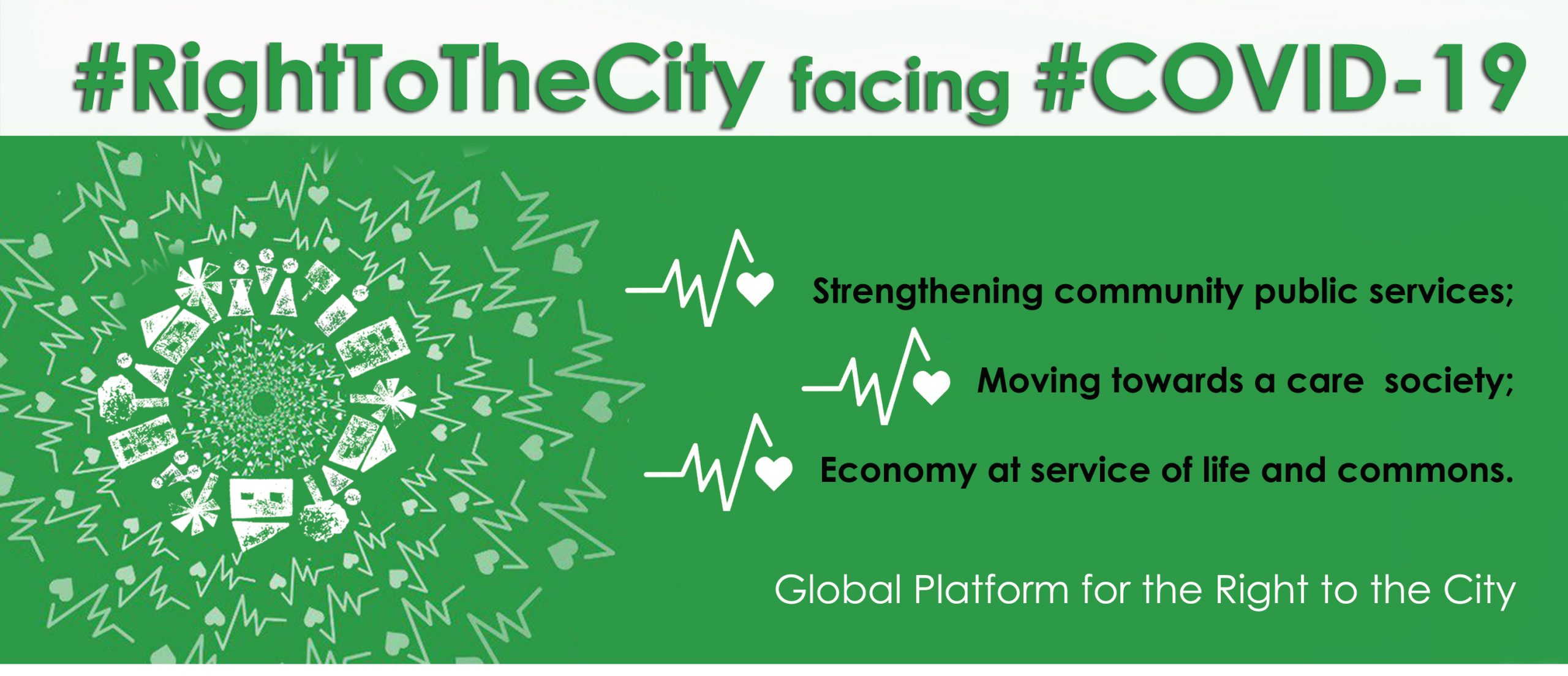
The Global Platform for the Right to the City (GPR2C) joins the international and collective efforts to combat COVID-19. THis communiqué was drafted along with our members in face of the magnitude of the COVID-19 crisis and its effects around the world. You can read more here.
The Right to the City facing COVID-19
The Global Platform for the Right to the City (GPR2C) joins the international and collective efforts to combat COVID-19.
We express our commitment and solidarity with the groups most vulnerable to the pandemic, in particular the homeless, slum dwellers, people threatened by evictions, displacements and collapses of their homes due to natural or everyday occurrences, informal workers and impoverished people, particularly women, older people and dissidents of all ages who suffer multiple violences. At the same time, we express our admiration and gratitude for the health and cleaning professionals, informal waste workers, the caregivers and scientists, and the staff of markets and other basic services at this time of crisis.
The GPR2C envisions democratic, diverse, solidary and sustainable communities, understood as common habitats where all inhabitants enjoy the human right to a life with peace, security, health and dignity. The Right to the City is a collective right that emphasizes democratic management, the territorial integrality and interdependence of all internationally recognized civil, political, economic, social, cultural and environmental rights.
Given the current situation, we join the voices that claim for:
- Recovering and strengthening community public services
- Moving towards a care society, recognizing the particular care role of women within households and communities;
- Design democratic mechanisms for a massive redistribution of social wealth and an economy at the service of life and the commons.
We urge all governments to take immediate steps to respect their legal obligations arising from the ratification of the International Covenant on Economic, Social and Cultural Rights. In particular, article 11 (right to housing) and article 12 (right to health protection) with public health, housing and urban planning policies, based on human rights and environmental rights rather than on protecting profits. These policies must be financed by overcoming the blockages caused by the monetary parameters of public budgets, including through the renegotiation or cancellation of sovereign debt, in particular by the International Monetary Fund and the World Bank.
More specifically, we join hundreds of organizations around the world to insist that our governments and the international community adopt measures that will allow to:
- Ensure all fundamental human rights are respected, especially the right to adequate housing, food and nutrition. Human rights are indivisible.
- Protect persons and communities most vulnerable and directly affected by the virus or its economic and social impacts.
- Fight inequality, racism, discrimination, violence against women, girls, older people and segregation, aggravated in times of crisis;
- Stop forced evictions and displacements and provide housing for homeless people.
- Ensure basic supplies such as drinking water, food, electricity and sanitation to all.
- Stop job lay-offs and carry out a plan of economic and social support to the self-employed.
- Guarantee Universal Basic Income and free healthcare for all, including undocumented workers, migrants and refugees.
- Guarantee public and universal healthcare to all and, in particular, to people living on the streets , migrants, refugees.
- Ensure public investment in scientific research to develop responses and solutions to the current and future crises under mechanisms that protect this process from market dynamics.
- Immediately suspend all external sanctions on food and medicine from countries that suffer from them such as Cuba, Venezuela, Syria, North Korea, Iraq and Iran. These measures are not admissible; their persistence is a crime against humanity.
- Provide accurate and timely information on public health issues.
- Ensure the participation of civil society in the planning, implementation and evaluation of responses to this emergency to ensure that measures and actions do not unduly infringe on human rights and fundamental freedoms.
The present crisis highlights the collective nature of the cities and territories we live in. This crisis affects us all. However, the impacts suffered differ for certain people and communities, as do the resources and capacities to deal with them. Therefore, it is essential that any strategic response has at its core a commitment to people vulnerable to health threats, as well as those who are socially, economically and territorially marginalized.
We support committed local authorities and governments and call on all governments and institutions to respect activists engaged in the fight for these human rights.
The global crisis generated by COVID-19 shows the urgency of putting life and people before profit. Faced with a situation of this magnitude, it is clear that solutions will have to be cross-border and that all actors – all spheres of government, professions, private sector and civil society organizations – must coordinate and work collectively for the common good.
Click here to download the GPR2C Communiqué on the COVID-19 crisis




